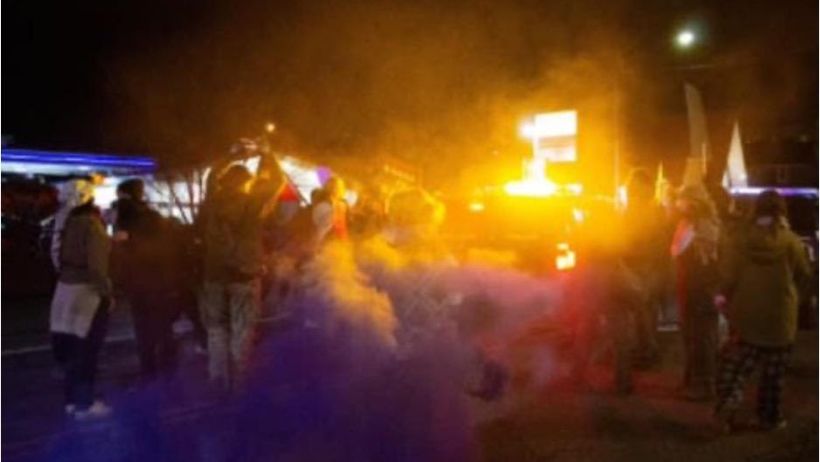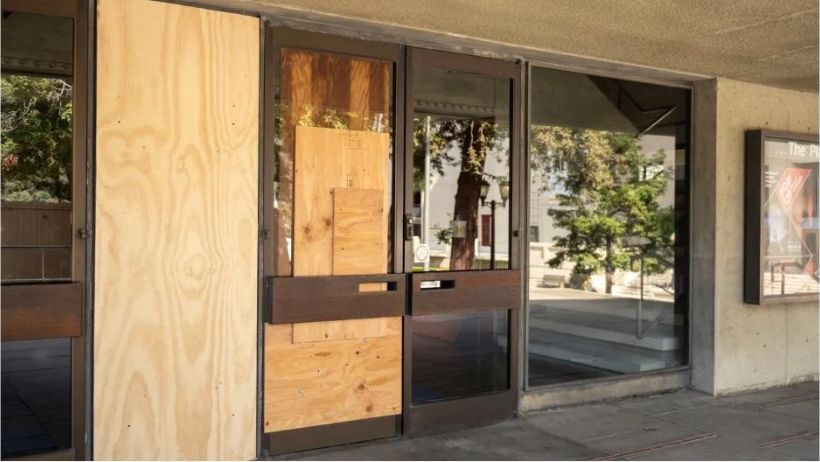Oasis Songs: Musings from Rav D
Friday, March 1, 2024 / 21 Adar Rishon 5784
Summary: There have been some horrific incidents of antisemitism this past week in Berkeley and Portland. This article explores the correlation between current trends of antisemitism on America’s West Coast and historical events such as Kristallnacht and the rise of the Nazi party.
Reading Time: Four minutes
We are well past words, though the wicked chants that have brought us here continue. On Monday night, February 26, 2024, a 200-person-strong mob of pro-Palestinian protesters, The Bears of Palestine, gathered outside the Zellerbach Playhouse on the University of California’s Berkeley campus. Yes, a mob, not a protest, as will shortly become clear to those who missed this story.

What was the event which provoked such a strong response by The Bears of Palestine? A presentation by Ran Bar-Yoshafat, an Israeli attorney, on whether Israel’s actions in its ongoing war against Hamas meet international legal standards. The protesters wore keffiyehs, a black and white checkered scarf first popularized by Yasser Arafat, that has become a symbol of Palestinian resistance. It’s important to acknowledge that peacefully protesting the war in Gaza aligns with democratic norms. Nonviolent demonstrations are one important lever of democracy. The key here is nonviolence. I will have more to say about when free speech veers into violent rhetoric, but physical violence crosses a frightening line.
Many of these protesters also wore masks. Ironically, the same individuals who hid their faces screamed, “You can’t run! You can’t hide! We charge you with genocide!” Who was hiding? While the protesters engaged in hateful rhetoric, they crossed a line into violence when they banged on the glass door of the Zellerbach Playhouse until it shattered. Despite the police presence, The Bears of Palestine stormed the theater, knocking one student to the ground, spitting and screaming slurs at others, and apparently even choking or grabbing the neck of a female student.

Meanwhile on the same night in Portland, the Jewish musician, Mattisyahu, was performing at the Aladdin Theater, where aggressive protesters also crossed the line from protest to violence. My friends, Joshua and Leah Safran, had to walk past this local mob to get inside. On their way, a man began to punch him, ripping Joshua’s phone from his hand, jamming his fingers. Leah heard individuals demanding to know “how many babies we killed today.” The rioters donned helmets, tossed smoke bombs at the theater doors, and stormed the metal barricades with a makeshift battering ram. They, too, began to bang on the glass doors before the police were able to repel them.
These are but two small incidents of a rise in global antisemitism that force us to revisit November 9-10, 1938. That is the date of Kristallnacht (The Night of Broken Glass), in which the Nazi regime instigated wholesale destruction of Jewish homes, synagogues, and businesses. It marked the turn from discriminatory policies and rhetoric against German Jews into the overt violence that would lead to the genocide of the Shoah.
These recent events may not reach the scale of Kristallnacht, but it almost always begins with words. As our liturgy reminds us in barukh she’amar, the human world is created through speech, for like our eyes, public speech is the window to a society’s soul. Our national, even our global, soul is sick. Indeed, on social media sites around the world, where so much of modern life takes place, ten thousand Jewish windows are broken every day. Kristallnacht.
The darkly insistent history of Jew hatred can leave us wondering about where the line is between vigilance and a hyper-vigilant anxiety that exists as the traumatic residue of Jewish history. Despite the reality of our people’s past, we shouldn’t allow ourselves to fall prey to an easy hysteria; when those feelings arise, we should check and analyze them, as well as the conditions that produced them. Clearly, there are important differences between the historical atrocity that was Kristallnacht and the contemporary rocket blast of exploding antisemitism. The former was the direct product of a totalitarian regime that held the levers of governmental power and sanction. That is not currently the case in America.
As important as that difference is, we mustn’t let it numb us to the very real dangers that exist. The Brown Shirts may never have been an official part of the German government, but they were instrumental in Hitler’s rise. This reminds us that hate speech normally precedes changes in governmental policy. Jews know too well that the country that protects us today can face a change in leadership or structure; we have been expelled, discriminated against, and repeatedly beaten, raped, or murdered. Additionally, one would have to search long and hard to find incidents of Jew hatred that weren’t a semaphore for larger societal rot. It has been said, correctly, that antisemitism is a problem and a sickness of the non-Jew. Although it harms Jews first and foremost, its presence is a barometer of social unrest and suffering. A society that actively and publicly hates Jews is in the process of dismantling itself.
Only in hindsight will it become clear whether today’s challenges are merely a murky downward dip through which all societies traverse, or if it is a harbinger to something far darker. I for one don’t believe that our fates are predetermined. What we do today matters; the small positive actions we each can take today may prove to be the difference in America’s future. What this demands of us, then, is to take the current threats very seriously, even as our efforts continue unabated. Rabbi Nahman’s words have never rung more true: “All the world’s a narrow bridge, but the main thing is not to fear at all.”
Shabbat Shalom,
Rav D
Shabbat Table Talk
- Have you recently encountered the “broken glass” of our time? Where did you see it? What form did it take?
- When has a strongly-held fear of yours, which seemed an accurate picture of reality while you were gripped by it, proved to be unfounded?
- Can you recall a time when some small, positive action of yours shifted a seemingly intractable situation?
If you’d like to continue this discussion, follow this link to CNS’s Facebook page to share your own perspectives on the topics raised in this week’s Oasis Songs. Comments will be moderated as necessary.



